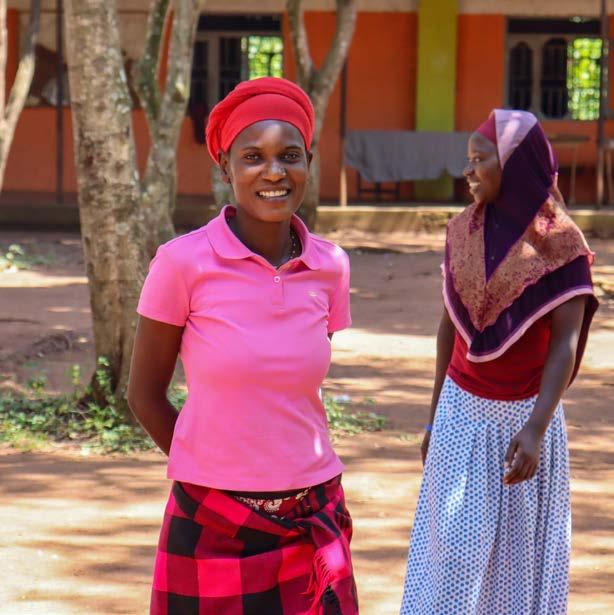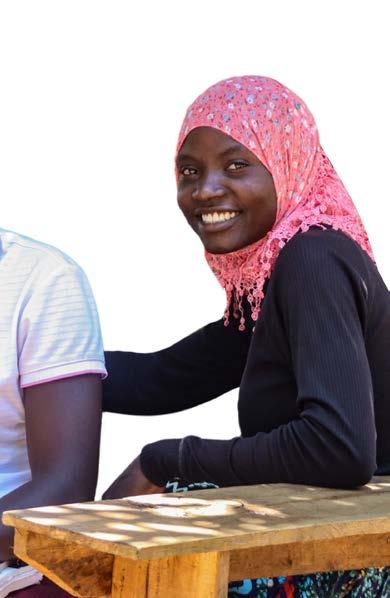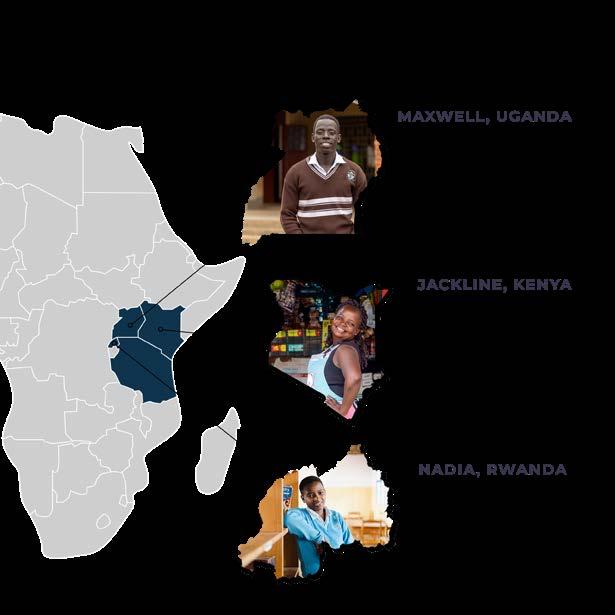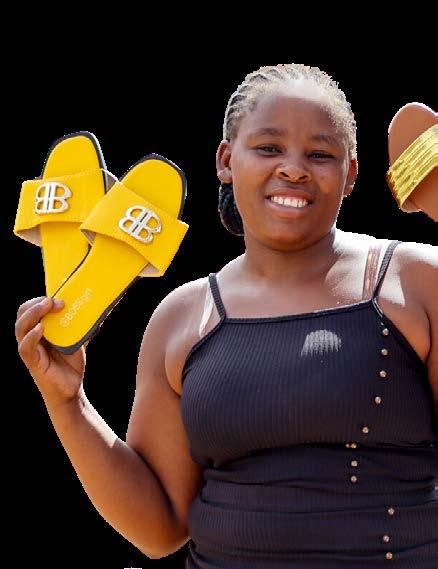


Livelihood Bootcamp, Uganda
Photocredit:SarahKenyi





Livelihood Bootcamp, Uganda
Photocredit:SarahKenyi

At Educate!, you’ll often hear our team use the words ‘measurably impacted.’ To us, this isn’t just a trendy phrase; it’s a fundamental principle deeply embedded in our identity.
As a ‘youth first, impact-obsessed’ organization, we don’t quantify our impact based on the number of young people we engage but by the measurable outcomes they are equipped to achieve, including increased income and economic activity, improvements in agency and gender equity, and greater educational attainment.
The stories you’ll read in this report highlight the transformational change we aim for, featuring young leaders across East Africa who are applying newfound skills to reshape their futures and positively impact their communities.
These individuals are among the growing number of young people impacted by Educate!’s solutions – a number which has now reached over 390,000. This marks a 1,000-fold increase since we first launched our model in Uganda over a decade ago!
As we build on this foundation to scale to new countries and contexts, we continue to ground our work in learning and evidence. Our team leverages targeted evaluations to ensure that every experience we create makes a meaningful difference in the lives of young people.
This commitment has enabled us to continuously iterate toward greater impact.
In 2023, our education reform and teacher training model reached national scale in Rwanda, and we’ve continued to deepen government partnerships in Tanzania and Kenya. At the same time, we have worked to refine the impact we’re delivering outside of the classroom – empowering thousands of youth unable to complete secondary education through our livelihood bootcamps.
With your steadfast support and partnership, we’re fast en route to achieving our bold goals for growth, and we are energized by the opportunities to continue to innovate.
Together, we are creating a future where every young person has the opportunity to achieve their aspirations.
With gratitude and optimism,




As we scale our solutions, we’re intent on maintaining Educate!’s unique culture of learning and iteration, aligning our team around our core values.

First,
We never forget that Educate! exists to impact youth.

We take pride in going above and beyond to achieve the best results.

We are committed to seeking and applying new knowledge and ideas.

Team,
We say what we think while treating each other well.

We will always keep innovating to grow our impact.
Young people are the key to a more prosperous future for Africa.
The continent has the world’s youngest and fastest-growing population. By 2035, more youth in Africa will join the global workforce each year than in the rest of the world combined.
Educate! prepares youth in Africa to learn, earn, and thrive in today’s economy by:
1. introducing an employment-focused school subject in secondary education, and
2. delivering livelihood bootcamps for out-of-school youth, with a focus on marginalized rural girls and young women.
By transforming education and expanding learning opportunities for hard-to-reach youth, we can empower them to build a brighter tomorrow.


“I’ve learned to be a job creator. I know how to make a business model and business plan.”
“Because of my grocery store, I can pay the school fees for my children even though I didn’t finish school.”
“After selling products in our student business club, I dream of owning a hair salon and becoming a successful businesswoman.”
Whether delivered in or out of schools, our core learning experience takes a real-world approach to support youth in building the critical skills needed to transition to work.

After leaving school due to pregnancy, Kenyan single mother, Precious, was struggling to provide for her daughter. Under the guidance of her bootcamp trainer and mentor, Priscilla, Precious gained business skills and launched her own enterprise selling shoes.
Priscilla, a successful beekeeper, offered personalized guidance. She emphasized the need for proper record-keeping, budgeting and reinvesting. Priscilla also introduced Precious to effective marketing strategies, showing her how to use platforms like Facebook and WhatsApp to advertise her shoes to her target market.
Beyond practical advice, Priscilla offered unwavering encouragement. With her earnings, Precious is providing for her daughter while saving for the little girl’s education and other important necessities.


“I
am proud of Precious because she has grown her business and income and she also employs another person.”
Priscilla, Bootcamp TrainerPhotocredit:KevinOuma
Young people across Africa are among the most impacted by climate change – especially girls. Recognizing this, we are exploring how youth can bolster climate advocacy and adaptation. Participants are introduced to sustainable enterprises like tree planting, water and waste management, eco-friendly charcoal briquettes, and upcycled products.

Esther, Ugandan climate activist and youth mentor, shows off the charcoal briquettes she makes with students.
Photocredit:SarahKenyi
During an Educate! lesson, you’ll often hear the mentor or teacher say: “Is it possible to hear from a girl now? We’ve just had a boy speaking.”
“It’s incredible to witness the transformation as youth start to see themselves as leaders who value creating more equitable communities.”Hellen Namisi, Director of Program Implementation

Attention to classroom dynamics is just one aspect of our gender-transformative approach. From the curriculum materials we use to analyzing barriers to participation and tracking outcomes for young women, gender equity is embedded across our work.
Sessions on gender equity unpack stereotypes, exploring what is traditionally seen as men’s work versus women’s work, and include exercises to build assertiveness. Through this experience, women develop the self-belief to start businesses while men become aware of the value of supporting the aspirations of their female peers.
In our partnerships with government, Educate! advocates for the inclusion of gender pedagogy within national frameworks and teacher training policies. Additionally, we’re scaling this approach through our livelihood bootcamps, which promise to reach the many young women unable to complete secondary school.
In doing so, we aim to prepare young women and men to set higher goals for themselves, both economically and in their family lives.
Redefining what schools teach and how they teach it has the potential to equip youth to thrive in the world of work.
Young people have immense potential to transform their communities, if given access to an education applicable to today’s economy. To achieve this, Educate! collaborates with key partners to integrate an employment-focused subject into secondary schools.
We began this work in Uganda in 2009 with a leadership and entrepreneurship model delivered directly to students by youth mentors.
This experience centers soft skills that serve as building blocks for long-term success. On top of that foundation, we teach hard business skills needed to navigate the formal sector as well as Africa’s largely informal local economies. The cornerstone of this model is Skills Lab, our studentcentered pedagogy.
To scale this model, Educate! targets system-level adoption. Drawing on years of experience, we provide technical advice to governments on the design of a single subject. This is followed by support for reform implementation. Integrating into national education systems in this way allows us to reach even greater numbers of students.
To date, we’ve established strong partnerships with local and national governments across East Africa, collaborating to incorporate employment skills into curriculums in Uganda, Rwanda, Kenya, and most recently, Tanzania.
Through strategic partnerships, Educate! is co-designing solutions to better prepare youth for the evolving demands of the labor market.

Educate! centers essential skills for today’s economy taught through our studentcentered pedagogy, Skills Lab. The pedagogy breaks down learning into three stages: build,practice,andpresent.We emphasize practical application over theory. In the first stage, the teacher builds on students’ existing knowledge to introduce a concept like market research, then comes group work in the form of activities like case studies and community interviews, and finally, students present their insights to peers.

“Since
using Skills Lab, I’ve noticed big changes. Students pay attention. They really enjoy the lessons and many of them start businesses.”
Grace Umutoniwase, Entrepreneurship Teacher, RwandaBuilding partnerships and policies together with national stakeholders, investing in teacher training, and embedding sustainability structures – this three-stage strategy encourages uptake and implementation of education reform at every step.
A core component of this strategy is a two-year teacher training model that builds educators’ capacity to deliver Educate!’s Skills Lab pedagogy and project-based learning. Using peer coaching, with teachers training fellow teachers, this cost-effective model can reach thousands of educators and builds communities of practice.

In Rwanda, where we partnered with the government to help reform the subject of Entrepreneurship, we’ve made particularly exciting progress!
In 2023, our education reform and teacher-training model scaled nationally in the country, impacting 165,000 learners annually.
The reform process involves learning alongside national stakeholders to develop a shared understanding of the educational landscape, identify pain points, and set the stage for effective problem-solving.
By building on a country’s existing goals to better prepare students for life after graduation, and aligning with key partners from the outset, we can create meaningful impact.
Educate! uses our three-stage approach to systems change to support countries in reforming a single subject that prepares students for the labor market.
These reforms signify an encouraging shift across the region. Youth leverage learning to drive job creation and growth not only on the continent but also on a global scale.
In 2023, Tanzania embraced a major reform, with Educate! as technical advisors. The Commissioner for Education granted approval for the subject of Business Studies – presenting an opportunity to transform education for the country’s 2.8 million lower secondary students.
Together with policymakers, we conducted extensive user research and a mini-pilot to gather feedback on the subject’s effectiveness and the impact of active teaching techniques. The positive outcomes from this first stage have set a solid foundation for the rollout of the reform, expected in 2025.
In Kenya, a partnership agreement with the Ministry of Education has formalized Educate!’s role as technical partners for the co-design of Community Service Learning. We supported the creation of pedagogical standards for the subject, which prepares students with social, entrepreneurial, and practical skills.
Together with the government, we are taking important steps to equip the 3.9 million students enrolled in Kenya’s secondary schools with the tools to build livelihoods.


“One cannot speak of the introduction of Business Studies into Tanzania’s curriculum without mentioning Educate!. They provided huge support in developing curriculum support materials, preparing training modules, and providing the actual training, all of which will enable teachers to implement the subject effectively.”
Dr. Aneth Komba, Director General, Tanzania Institute of EducationImagine if the most marginalized rural girls and young women could access post-primary education, even if they couldn’t return to school.

Nearly 50% of secondary-age youth are not in school across much of Africa. ~50%
Rural girls face even greater barriers to access, with only 1 in 20 on track to complete secondary education.
Secondary education remains the primary pathway for equipping youth to earn dignified livelihoods. However, across East Africa, millions are unable to access it due to financial constraints, early pregnancy, and other barriers.
In response, Educate! has set out to build livelihood bootcamps that bring quality learning and skill-building opportunities to young people who are out of school, with a particular focus on girls and young women.
Following the pandemic, Educate! leaned heavily into this work. Recognizing that the need could not be more urgent, we developed alternative pathways to employment for the nearly 50% of young people unable to access formal education.
By engaging deeply in research and development, running pilots, and listening to feedback from youth, we are building livelihood bootcamps hyper-tailored to their needs.
Photocredit:SarahKenyi

85-90% of youth in East Africa will work in the informal sector.
Educate!’s livelihood bootcamps engage youth in interactive learning activities, role playing, and real-world experience. The curriculum reflects the reality that many young people will find employment in the informal sector. We focus on cultivating a growth mindset and identifying economic opportunities, preparing participants with the tools they will need to launch a business.
As a single mother, Prossy left school to support her child through agricultural work. Struggling with low wages and unscrupulous employers, she needed a stable income for her family.
Through Educate!, Prossy learned how to identify viable business opportunities that address challenges in her community. With her trainer’s support, she prepared a plan for a notebook-making business.
By selling notebooks to local stationary stores and schools, she increased her income enough to support her daughter and parents.
Her ambitions extend further; she hopes to produce sanitary products for local women – a need she pinpointed during an opportunity identification session. She has already made handmade prototypes for sanitary towels and plans to acquire a sewing machine to produce more.
“My dream is to own a tailoring business where I can employ others and make reusable sanitary towels for women in my community.””

As we work on scaling livelihood bootcamps, we are continually evaluating impact to inform design and delivery. Data from five cohorts of the bootcamps in Kenya and Uganda have demonstrated encouraging impact on young people.
Three to six months after participation, youth are seeing increases in income and business ownership.

or greater relative increase in income.

absolute increase in business ownership, with a quarter of participants launching businesses for the first time after completing the bootcamp.
These statistics represent the most conservative results. In some instances, income surged by 149% after six months and 170% after three months.
These results are particularly encouraging as they demonstrate that a transformative learning experience that prioritizes learning by doing, driven by ongoing feedback from young people, can create a significant impact on livelihoods.
Educate!’s commitment to learning and evidence has enabled us to reach farther and aim higher – scaling measurable impact across multiple countries.
Over the years, we’ve invested continuously in rigorous impact evaluations, such as randomized controlled trials. While these RCTs generate important insights, we’ve also recognized a need for faster, more iterative learning.
Today we’re leveraging an agile approach, what we call our rapid impact assessment system (RIA), to build and strengthen our model. This “tinker and test” method is specifically designed to identify challenges, enabling us to learn, pivot, and adapt before scaling.
The system is set up to generate rapid learning tests that track design changes directly connected to youth outcomes, facilitating important feedback loops.
To do this, Educate!’s monitoring and evaluation team collects and analyzes data in quick, recurring cycles.
The design teams then leverage the insights gained to refine the model. Whereas a randomized controlled trial could take years to return results, the RIA system can provide valuable insights in just a few short months.
The system functions by embedding prepost evaluations and A/B tests within model delivery. Tests examine which competing program design drives the most significant outcomes for participants. For example, what curriculum, A or B, is most effective for driving impact on select indicators for girls?
This also allows us to think about how the design of a model might function in a new geography or context.
While navigating roadblocks and learning from challenges can be difficult, they are critical to strengthening our approach and building more effective solutions.
The learning loops established by the RIA system have enabled us to tackle roadblocks faster, identify gaps early, and whittle down the components of a model into its most impactful form.


“Teams must be empowered with insights for agile decision-making and swift course correction. Iterative learning makes this possible. Change rarely happens in leaps and bounds but rather in small steps through iteration and improvement, all toward the goal of achieving transformative impact.”
Phillip Okull, Director of Impact EvaluationThe UN Girls’ Education Initiative learning brief, ‘Ending Gender Stereotypes in Classrooms,’ featured our gendertransformative approach.

Principal Product Strategist, Rogers
Patrick Kamugisha, was shortlisted as a finalist for T4 Education’s Africa Education Medal, recognizing his exceptional impact, leadership, and advocacy.
At the Teach For All Global Conference, Sylvia Mwangi, Head of National ProgramsCSL, joined a panel with Mastercard Foundation and Junior Achievement Africa to explore strategies to prepare students for future careers.
At the 2023 Global Youth Economic Opportunities Summit, Alex Kelly, Global Director of Growth and Revenue, partnered with Wezesha Impact to showcase the increasing need for alternative pathways to employment.

Educate! was cited in a joint report by the World Bank, ILO, and UNESCO, highlighting the link between foundational skills for self-employment and Technical and Vocational Education and Training (TVET).
In conversation with the World Bank’s Solutions for Youth Employment (S4YE), Educate! shared insights on designing livelihood bootcamps to serve out-of-school girls and young women.
The Global Partnership for Education (GPE) blog spotlighted CAMIS, an innovative assessment software developed by Educate!, the Rwandan government, and key partners.
Director of Technology and Performance Metrics, Sam Mbugua, spoke at the 2nd KIX Continental Symposium on Education Research in Africa, sharing how CAMIS is paving the way for more dynamic, relevant, and effective education.
We are deeply grateful for the generosity of our partners and champions, including the many not listed here. Every dollar of support has enabled Educate! to measurably impact over 390,000 youth to date.
$250,000+
Anonymous
Anonymous
Atlassian Foundation International
Bedrock Giving Group
Children’s Investment Fund Foundation (CIFF)
Echidna Giving
Imaginable Futures
Livelihood Impact Fund
Ray and Tye Noorda Foundation
$50,000 - $99,999
Efrusy Family Foundation
GDI Solutions & The Agency Fund
L’Oréal Fund for Women
Manitou Foundation
T&J Meyer Family Foundation
$10,000 - $49,999
Amy Kates
ECOM Foundation
New Rain Foundation
Nu Skin Force for Good Foundation
Radhika Malpani
Rainwater Charitable Foundation
Short Family Charitable Fund
The West Foundation
$100,000 - $249,999
Centre of Excellence for Development Impact and Learning (CEDIL) funded by UK aid
CG Charitable
Hampshire Foundation
Medicor Foundation
Pilot House Philanthropy
Stichting Dioraphte
Wellspring Philanthropic Fund
$2,000 - $9,999
Big Win Philanthropy
Brian and Claire Makare
Halle Family
Kiran D’Souza
Nancy and David Ratner
Perl Nelson Family Foundation Inc.
Ron and Dianne Hoge
Tab for a Cause
Vinay D’Souza
Wendy and Scott Falk
The figures below represent unaudited financials for 2023. Full audited financial statements will be shared on our website when available.


Net assets at beginning of year
Net assets at end of year
Change in net assets $22,327,898 $24,172,347 $1,844,449
LIABILITIES AND NET ASSETS
CHANGE IN NET ASSETS Current assets Other assets Total assets $10,296,578 $14,190,774 $24,487,352 ASSETS Total liabilities Net assets Total liabilities & net assets $310,537 $24,176,815 $24,487,352

Jeff Aludo Founder and Chief Strategist, The Aludo Group; Former Director, PwC

Radhika Malpani Lecturer, Stanford University; Associate Adjunct Professor, UC Santa Cruz; Founder, Google Images; Former Senior Engineering Director, Google

Boris Bulayev CEO and Co-founder, Educate!

Eric Glustrom, Chair Co-founder, Educate!; Founder & CEO, Watson Institute

Nikita Miller
SVP Head of Product, The Knot Worldwide; Former VP of Product, Dooly; Former Group Product Manager, Trello (Atlassian); Former Principal Product Manager, Knewton

Dzingai Mutumbuka
Former Minister of Education, Zimbabwe; Former Senior World Bank Official; Former Chairman, ADEA

Amy Kates Owner, Amy Kates Organization Design Advisory
The Educate! Brain Trust is an advisory group that supports the collaborative innovation and development of our solutions for youth who are out of school.
Nadi Albino
Deputy Director of Partnerships and Resources
Mobilization, Generation Unlimited
Paul Atherton Founder, AI-for-Education. org; Founder, Fab Inc.; Former Education Economist, DFID
Dedo Baranshamaje
Director of Strategy, Segal Family Foundation
Nick Burnett, Chair Senior Fellow, Results for Development
Shubha Jayaram
Deputy Director of Strategy, Planning and Management, Bill and Melinda Gates Foundation
Kim Kerr
Education & International Development Consultant; Former Director of Regional Programs, Mastercard Foundation
Xiaoyan Liang
Lead Education Specialist, World Bank
Teresa Mbagaya Investor; Advisor
Patrick Obonyo Programme Manager, IKEA Foundation
Nancy Taggart Vice President, Making Cents International; Former Senior Advisor, USAID
Devang Vussonji Director, Elimu-Soko; Founder, Axum
 Beatrice, Bootcamp Graduate, Kenya
Beatrice, Bootcamp Graduate, Kenya
Bootcamp Graduate, Ivan, alongside Educate! team members Juliet Tibiri and Dorothy Namubiru.
Photocredit:SarahKenyi
